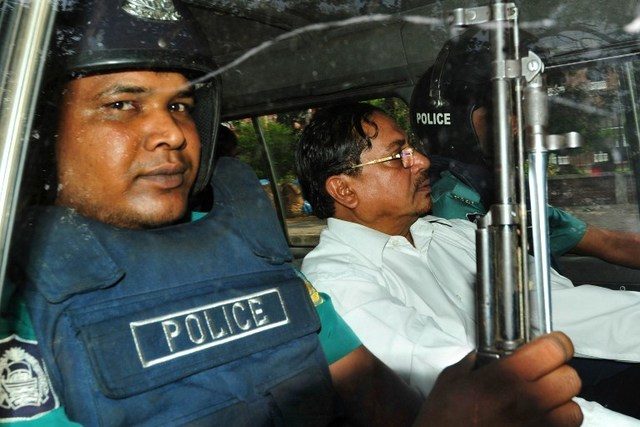SUMMARY
This is AI generated summarization, which may have errors. For context, always refer to the full article.

DHAKA, Bangladesh (2nd UPDATE) – Bangladesh authorities on Saturday, April 11, hanged a top Islamist leader for overseeing a massacre during the nation’s 1971 independence war against Pakistan, officials said.
“Mohammad Kamaruzzaman has been executed at 10:30 pm Bangladesh time (1630 GMT or 12:30 am Sunday Philippine time),” law and justice minister Anisul Huq told Agence France-Presse (AFP).
Four specially trained convicts took him to a makeshift gallows, set up near his prison cell, and hanged him using a rope, in line with Bangladeshi jail procedure. He was declared dead by a magistrate and a government doctor.
Kamaruzzaman, the third most senior figure in the Jamaat-e-Islami party, was convicted of abduction, torture and mass murder as one of the leaders of a pro-Pakistan militia that killed thousands of people during Bangladesh’s bloody independence struggle.
Hundreds of secular supporters burst into cheers and made victory signs, as news of the hanging was announced at Shabagh square in central Dhaka where they gathered to celebrate the death of a man they called a “war butcher”.
Kamaruzzaman, 62, became the second Islamist to be hanged for atrocities during the 1971 war of independence against Pakistan. Abdul Quader Molla, the fourth-highest ranked leader of the Jamaat-e-Islami party, was hanged in December 2013.
Police said security was tightened outside the capital’s main jail and across the country ahead of the hanging.
“We are alert to prevent any violence or subversive acts,” Dhaka police spokesman Jahangir Alam Sarker told AFP.
Kamaruzzaman was originally expected to be hanged in the early hours of Saturday morning, but the execution was postponed at the last minute, with no official reason given.
Bangladesh went ahead with the execution despite last-minute pleas by the United Nations, the European Union and human rights organisations to halt the hanging. The UN said the trial did not meet “fair international” standards.
Just hours before the execution, members of Kamaruzzaman’s family visited him at the prison, surrounded by tight security.
“We found him in good health and not worried about his fate at all,” his eldest son Hasan Iqbal told AFP after seeing his father.
“In his last comments, he regretted that he did not see the victory of Islamic movement in Bangladesh. But he was confident that it would be victorious here one day,” he said.
The family had dug a grave at his village in northern Sherpur district where he would be buried on Sunday, he added.
The country’s supreme court cleared the last hurdle for execution of Kamaruzzaman on Monday after rejecting his final appeal against the original death sentence handed down to him by a controversial war crimes court in May 2013.
He was given several days to seek clemency from the country’s President Abdul Hamid to avoid death. But his son said his father did not seek any mercy.
“My father said only Allah can give or take life, not a president,” he said.
‘Village of Widows’
Prosecutors said Kamaruzzaman presided over the massacre of at least 120 unarmed farmers who were lined up and gunned down in the remote northern village of Sohagpur during the 1971 independence struggle against Pakistan.
The remote northern hamlet that has since become known as the “Village of Widows”.
The nine-month conflict, one of the bloodiest in world history, led to the creation of an independent Bangladesh from what was then East Pakistan.
Three women who lost their husbands testified against him in one of the most emotive of all the war crimes trials.
“All 32 widows who are still alive are happy that the notorious killer has been hanged. Finally we got justice,” said Mohammad Jalal Uddin, a Sohagpur farmer who lost seven members of his extended family in the killing.
Analysts said the execution could deepen the country’s political crisis after the main opposition leader, Khaleda Zia, launched a nationwide protests in January to try to topple Prime Minister Sheikh Hasina’s secular government.
Jamaat, the nation’s largest Islamist party, is an ally of the Zia’s Bangladesh Nationalist Party (BNP).
Hundreds of Jamaat activists were killed in 2013 when the party held a series nationwide protests to halt the war crimes trials of its leaders.
Jamaat’s members have been accused of being behind a number of deadly firebomb attacks since the start of the year, including on buses. The violence in the last three months left at least 120 people dead.
Jamaat and the BNP have previously charged that the war crimes trials are mainly aimed at silencing Hasina’s opponents rather than delivering justice.
Hasina’s government says the trials – which lack any international oversight – are needed to heal the wounds of the conflict. – Rappler.com
Add a comment
How does this make you feel?
There are no comments yet. Add your comment to start the conversation.